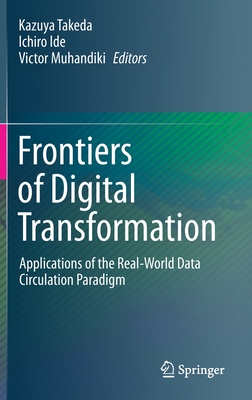Frontiers of Digital Transformation: Applications of the Real-World Data Circulation Paradigm
暫譯: 數位轉型的前沿:真實世界數據流通範式的應用
Takeda, Kazuya, Ide, Ichiro, Muhandiki, Victor
- 出版商: Springer
- 出版日期: 2021-05-19
- 售價: $6,740
- 貴賓價: 9.5 折 $6,403
- 語言: 英文
- 頁數: 239
- 裝訂: Hardcover - also called cloth, retail trade, or trade
- ISBN: 9811513570
- ISBN-13: 9789811513572
-
相關分類:
Data-visualization
海外代購書籍(需單獨結帳)
相關主題
商品描述
Proposing the concept of real-world data circulation (RWDC), this book presents various practical and industry-related studies in human, mechanical, and social data domains. RWDC is a new field of study, established by the information technology (IT) community.
In the real world, the speed of data transmission between computers surpassed that of human communications long ago and has since expanded exponentially. As a result, the origin of the majority of data has become non-human, mechanical, or natural sources; in fact, humans are merely the source of a small part of the current data explosion. Such expanding data transmission does not simply consist of single source-destination pairs, but actually circulates over a complex network connecting numerous sources and destinations. Such circulation is an important aspect of the underlying systems. Based on this concept, in order to tame and control the massive amount of data originating from non-human sources, the authors have been considering the insertion of acquisition, analysis, and implementation processes in the flow of data circulation.
This book introduces the outcome of the RWDC degree program organized at Nagoya University, Japan, collecting contributions from graduate students enrolled in the program from various research fields targeting diverse applications. Through examples of RWDC, the resulting creation of social value is illustrated. This book will be useful not only for those working on the topics discussed, but also to anyone who is interested in RWDC, digital transformation, and Industry 4.0.
商品描述(中文翻譯)
本書提出了現實世界數據循環(RWDC)的概念,並展示了在人類、機械和社會數據領域的各種實用和行業相關研究。RWDC是一個由資訊科技(IT)社群建立的新研究領域。
在現實世界中,計算機之間的數據傳輸速度早已超過人類通信的速度,並且自那時起以指數級增長。因此,大多數數據的來源已變成非人類、機械或自然來源;事實上,人類僅僅是當前數據爆炸中一小部分的來源。這種擴展的數據傳輸不僅僅由單一的來源-目的地對組成,而是實際上在連接眾多來源和目的地的複雜網絡中循環。這種循環是底層系統的一個重要方面。基於這一概念,為了駕馭和控制來自非人類來源的大量數據,作者考慮在數據循環的流動中插入獲取、分析和實施過程。
本書介紹了在日本名古屋大學組織的RWDC學位課程的成果,收集了來自不同研究領域的研究生的貢獻,針對多樣的應用。通過RWDC的例子,展示了社會價值的創造。本書不僅對於從事相關主題的工作者有用,也對任何對RWDC、數位轉型和工業4.0感興趣的人士有所幫助。
作者簡介
Kazuya Takeda is a Professor at the Institutes of Innovation for Future Society, Nagoya University, Japan. He received his B.E., M.E., and Doctor of Engineering degrees from Nagoya University, in 1983, 1985, and 1994, respectively. From 1986 to 1989 he was a researcher at the Advanced Telecommunication Research laboratories (ATR), Japan. He was a Visiting Scientist at MIT, USA from November 1987 to April 1988, and from 1989 to 1995, he was a researcher and research supervisor at KDD Research and Development Laboratories, Japan.
Ichiro Ide is a Professor at the Mathematical and Data Science Center, Nagoya University, Japan. He received his B.E., M.E., and Doctor of Engineering degrees from The University of Tokyo, Japan, in 1994, 1996, and 2000, respectively. From 2000 to 2004, he was an Assistant Professor at the National Institute of Informatics, Japan, and from 2004 to 2019, he was an Associate Professor at the Graduate School of Informatics, Nagoya University, Japan. Since 2020, he has been in the current position. From 2010 to 2011, he was a Senior Visiting Researcher at the University of Amsterdam, The Netherlands..
Victor Muhandiki is a Designated Professor at the Institutes of Innovation for Future Society, Nagoya University, Japan and also a Senior Researcher, International Lake Environment Committee Foundation (ILEC), Japan. He received his BSc. (Civil Engineering) degree from the University of Nairobi, Kenya in 1993, M.E., and Doctor of Engineering degrees from Kyoto University, Japan in 1997 and 2001, respectively. Over the past 20 years he has worked in the higher education field in Japan in various capacities. He has also been involved in international development work in the environment and water sectors and has traveled widely in Africa and Asia for research, field surveys and official missions and has consulted for various agencies including the Global Environment Facility (GEF), Japan Bank for International Cooperation (JBIC), Japan International Cooperation Agency (JICA), Organisation for Economic Co-operation and Development (OECD), World Bank (WB), and World Bank Institute (WBI).
作者簡介(中文翻譯)
高也武田是日本名古屋大學未來社會創新研究所的教授。他於1983年、1985年和1994年分別獲得名古屋大學的工學士、碩士及工程博士學位。從1986年到1989年,他在日本的先進電信研究實驗室(ATR)擔任研究員。他於1987年11月至1988年4月期間擔任美國麻省理工學院(MIT)的訪問科學家,並在1989年至1995年間擔任日本KDD研究開發實驗室的研究員及研究主管。
井戶一郎是日本名古屋大學數學與數據科學中心的教授。他於1994年、1996年和2000年分別獲得東京大學的工學士、碩士及工程博士學位。從2000年到2004年,他在日本國立資訊學研究所擔任助理教授,並在2004年至2019年間擔任名古屋大學資訊學研究所的副教授。自2020年以來,他一直擔任目前的職位。從2010年到2011年,他是荷蘭阿姆斯特丹大學的高級訪問研究員。
維克多·穆漢迪基是日本名古屋大學未來社會創新研究所的指定教授,同時也是國際湖泊環境委員會基金會(ILEC)的高級研究員。他於1993年獲得肯尼亞內羅畢大學的土木工程學士學位,並於1997年和2001年分別獲得日本京都大學的碩士及工程博士學位。在過去20年中,他在日本的高等教育領域擔任過多種職位。他還參與了環境和水資源領域的國際發展工作,並在非洲和亞洲進行了廣泛的研究、實地調查和官方任務,並為包括全球環境基金(GEF)、日本國際協力銀行(JBIC)、日本國際協力機構(JICA)、經濟合作與發展組織(OECD)、世界銀行(WB)和世界銀行研究所(WBI)等多個機構提供諮詢。












